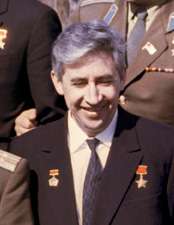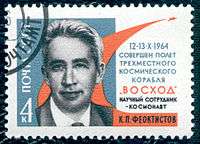Konstantin Feoktistov
| Konstantin Feoktistov Константин Феоктистов | |
|---|---|
 Konstantin Feoktistov in 1965 | |
| Cosmonaut | |
| Born |
7 February 1926 Voronezh, Soviet Union |
| Died |
21 November 2009 (aged 83) Moscow, Russia |
Other occupation | Engineer |
Time in space | 1d 00h 17m |
| Selection | Civilian Specialist Group 1 |
| Missions | Voskhod 1 |
Mission insignia |
|
| Awards |
|

Konstantin Petrovich Feoktistov (Russian: Константин Петрович Феоктистов; 7 February 1926 – 21 November 2009) was a Soviet cosmonaut and an eminent space engineer. Feoktistov also wrote several books on space technology and exploration. The Feoktistov crater on the far side of the Moon is named in his honor.
Biography
During the Nazi occupation of Voronezh, at the age of just 16, Feoktistov fought with the Soviet Army against the German troops, carrying out reconnaissance missions for the Voronezh Front.[1][2] After being captured by an Waffen-SS Army patrol, Feoktistov was shot by a German officer. However, the bullet went right through his chin and neck and did not kill him. Feoktistov was able to crawl out later and then make his way to the Soviet lines.
After the war was over, Feoktistov enrolled in the Bauman Moscow Higher Technical School as an engineering student and he graduated in 1949. Feoktistov also later earned a doctorate in physics. He joined Mikhail Tikhonravov's OKB (design bureau), and in 1955, Feoktistov formed part of the team that went on to design the Sputnik satellites, the Vostok space capsule, the Voskhod space capsule, and the Soyuz space capsule under the leadership of the Soviet Chief Designer Sergey Korolev. During this time, Feoktistov also worked on a design for an ion-propelled spacecraft to be capable of taking humans to Mars.
In 1964, Feoktistov was selected as part of a group of engineers for cosmonaut training, and in October of that very same year, he was hastily assigned to the multi-disciplinary Voskhod 1 crew. He was the first civilian to make a space flight, and the only cosmonaut in the Soviet Union who was not a member of the Communist Party of the Soviet Union.[3] During his space flight, he spent just over 24 hours and 17 minutes in space.[4]
After the flight of Voskhod 1, Feoktistov's training for any further space mission was discontinued for medical reasons. However, Feoktistov continued his outer space engineering work, and he later became the head of the Soviet space design bureau that designed the Salyut and Mir space stations.
In October 1969, Konstantin Feoktistov and Georgi Beregovoi traveled as guests of NASA throughout the US, visiting any city they chose and Disneyland in California – they were joined on the trip by US astronauts as hosts, including Eugene Cernan, Neil Armstrong and others. Kirk Douglas and others hosted receptions for them in Hollywood – they were protected by special agents of the US State Department on request of NASA. Almost every place they went when accompanied by Eugene Cernan, if a band was present the song "Fly Me to the Moon" was played – when they visited Disneyland they enjoyed the ride Trip To The Moon, then joked with the US astronauts that they went to Disneyland and not the moon. It was a trip that all enjoyed and international friendships were made. Feoktistov resigned from his engineering position with Energia and then returned to Bauman Moscow Higher Technical School as a professor in 1990.
Honours and awards
- Hero of the Soviet Union
- Title Pilot-Cosmonaut of the USSR
- Order of Lenin
- Two Orders of the Patriotic War 1st class
- Two Orders of the Red Banner of Labour
- Order of the Badge of Honour
- Medal "For the Victory over Germany in the Great Patriotic War 1941–1945"
- Medal "For the Development of Virgin Lands"
- State Prize of the USSR
- Lenin Prize
- Hero of Socialist Labour (Vietnam)
References
- ↑ Former Soviet cosmonaut Konstantin Feoktistov dies, BBC News, 22 November 2009, retrieved 29 November 2009
- ↑ "Феоктистов Константин Петрович" [Feoktistov Konstantin Pavlovich]. www.warheroes.ru (in Russian). Retrieved 2015-12-24.
- ↑ Скончался космонавт Константин Феоктистов. Vesti.ru (22 November 2009). Retrieved on 16 July 2014.
- ↑ Константин Петрович Феоктистов. Astronaut.ru. Retrieved on 16 July 2014.
Further reading
| Wikimedia Commons has media related to Konstantin Feoktistov. |
- Roskosmos (22 November 2009), Умер лётчик-космонавт СССР Феоктистов Константин Петрович (in Russian), retrieved 7 April 2010
- Associated Northcliffe Digital (23 November 2009), Konstantin Feoktistov, archived from the original on 1 February 2010, retrieved 29 November 2009
- Martin Childs (28 November 2009), "Konstantin Feoktistov: Cosmonaut who helped set a space altitude record on Voskhod I", The Independent, retrieved 29 November 2009
- A.I. Ostashev, Sergey Pavlovich Korolyov - The Genius of the 20th Century — 2010 M. of Public Educational Institution of Higher Professional Training MGUL ISBN 978-5-8135-0510-2.
- "S. P. Korolev. Encyclopedia of life and creativity" - edited by C. A. Lopota, RSC Energia. S. P. Korolev, 2014 ISBN 978-5-906674-04-3
- The official website of the city administration Baikonur - Honorary citizens of Baikonur
|